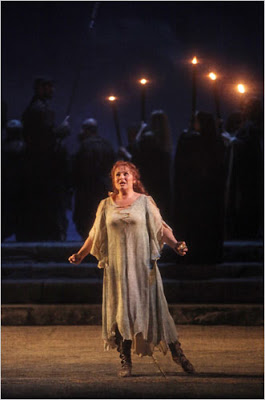Neuroscience

Musical hallucinations have been reported in the psychiatric literature, most often associated with schizophrenia, depression, and OCD [also with deafness]. The incidence has been estimated to be somewhere between 0.16% to 27% (Schakenraad et al., 2006). They are less commonly observed during confusional states, when visual hallucinations are more typical. Rentrop et al. (2009) have reported an unusual case study of a 74 year old mathematician and opera buff, who presented at the hospital for emergency surgery of the colon. Shortly thereafter...
References
Rentrop M, Knebel C, Förstl H. (2009). Opera-hallucinosis. Int J Geriatr Psychiatry 24:432-3.
Schakenraad SM, Teunisse RJ, Rickert MG. (2006). Musical hallucinations in psychiatric patients. Int J Geriatr Psychiatry 21:394–397.
Wagner's Götterdämmerung: The greatest test in opera for singers, conductor, orchestra – and audience
- Opera Singing In The Brain Scanner
The idea that the brain changes and adapts according to how you use it, including through adulthood, is now widely accepted in psychology and neuroscience. Some of the most striking examples of this have come from studies of musicians. It's been shown,...
- Compose New Music? In Your Dreams
The source of professional musicians’ creativity could lie in their dreams, report Piero Salzarulo and colleagues at the University of Florence. They asked 35 professional musicians and 30 non-musical students to complete a record of their dreams and...
- Fright Week: The Waking Nightmare Of Lord Voldemort
Nightmares can seem very real at times, but then we wake up and realize it was all a bad dream. Now imagine having a vivid nightmare with all the reality of waking life and then... it turns out you're actually awake through it all! This happened...
- Musical Hallucinations
From tomorrow's New York Times: Neuron Network Goes Awry, and Brain Becomes an IPod By CARL ZIMMER The New York Times Published: July 12, 2005 [snip] Only a handful of brain scans have been made of people with musical hallucinations. Dr. Tim Griffiths,...
- More From Daniel Levitin
Daniel Levitin, neuroscientist at McGill University and professional musician, has been in the (science) news a lot lately. He just published This is your brain on music : the science of a human obsession, the New York Times wrote about him a few weeks...
Neuroscience
Götterdämmerung Halluzination

Sara Krulwich/The New York Times
Katarina Dalayman as Brünnhilde, in the Metropolitan Opera production of Götterdämmerung.Musical hallucinations have been reported in the psychiatric literature, most often associated with schizophrenia, depression, and OCD [also with deafness]. The incidence has been estimated to be somewhere between 0.16% to 27% (Schakenraad et al., 2006). They are less commonly observed during confusional states, when visual hallucinations are more typical. Rentrop et al. (2009) have reported an unusual case study of a 74 year old mathematician and opera buff, who presented at the hospital for emergency surgery of the colon. Shortly thereafter...
...he began to suffer from near complete insomnia and mentioned only briefly that ‘this monkey music’ kept him awake. His condition deteriorated and 5 days later he admitted, that he heard complete operas at night from the very first to the last chord, ‘and you know how long these operas are’. He could not offer any explanation as to where these sounds came from, could not distance himself from his elaborate musical perceptions, had no means of interrupting them, and feared the first notes of another overture (which reliably rang out soon after sunset). On examination during daytime he appeared tired and irritable, rather uncooperative with poor concentration, but without overt evidence of a severe confusional state. His medical history was inconspicuous, but it became obvious that he was a dedicated opera-lover with a profound musical expertise, which he had acquired over decades of studying scores and librettos in every detail.His labs and CT scan appeared to be relatively normal. The patient was started on the atypical antipsychotic drug olanzapine, and after 7 days:
He regained his strength, became friendly, cooperative, and still appeared puzzled about the vivid orchestrations of his musical memory. His neuropsychiatric status was completely normal at discharge.The authors ended their Letter to the Editor in deadpan fashion:
"...this is (probably) the first report of a patient with a musical hallucinosis of complete operas."
References
Rentrop M, Knebel C, Förstl H. (2009). Opera-hallucinosis. Int J Geriatr Psychiatry 24:432-3.
Schakenraad SM, Teunisse RJ, Rickert MG. (2006). Musical hallucinations in psychiatric patients. Int J Geriatr Psychiatry 21:394–397.
Wagner's Götterdämmerung: The greatest test in opera for singers, conductor, orchestra – and audience
- Opera Singing In The Brain Scanner
The idea that the brain changes and adapts according to how you use it, including through adulthood, is now widely accepted in psychology and neuroscience. Some of the most striking examples of this have come from studies of musicians. It's been shown,...
- Compose New Music? In Your Dreams
The source of professional musicians’ creativity could lie in their dreams, report Piero Salzarulo and colleagues at the University of Florence. They asked 35 professional musicians and 30 non-musical students to complete a record of their dreams and...
- Fright Week: The Waking Nightmare Of Lord Voldemort
Nightmares can seem very real at times, but then we wake up and realize it was all a bad dream. Now imagine having a vivid nightmare with all the reality of waking life and then... it turns out you're actually awake through it all! This happened...
- Musical Hallucinations
From tomorrow's New York Times: Neuron Network Goes Awry, and Brain Becomes an IPod By CARL ZIMMER The New York Times Published: July 12, 2005 [snip] Only a handful of brain scans have been made of people with musical hallucinations. Dr. Tim Griffiths,...
- More From Daniel Levitin
Daniel Levitin, neuroscientist at McGill University and professional musician, has been in the (science) news a lot lately. He just published This is your brain on music : the science of a human obsession, the New York Times wrote about him a few weeks...
